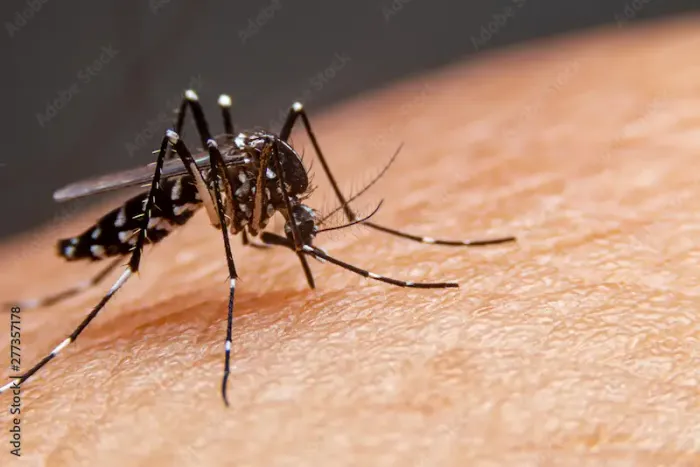Dengue Fever Symptoms, Treatment, and How to Stay Safe
Learn about dengue fever symptoms, treatment options, and prevention strategies. Stay informed and protect yourself and your family from this mosquito-borne illness.

Written by Dr. M L Ezhilarasan
Reviewed by Dr. Shaik Abdul Kalam MD (Physician)
Last updated on 13th Jan, 2026

Introduction
Dengue fever is a mosquito-borne viral infection that poses a significant public health threat in tropical and subtropical climates around the world, including many parts of India. Often called "breakbone fever" due to the severe muscle and joint pain it causes, it ranges from a mild flu-like illness to a potentially lethal complication known as severe dengue. With millions of cases reported annually, understanding this disease is the first step towards protection. This comprehensive guide will walk you through everything you need to know about dengue—from its first signs and symptoms to effective treatment options and crucial prevention strategies. Whether you're seeking information for yourself or your family, being informed can help you navigate this illness safely and know when to seek professional medical help.
What is Dengue Fever?
Dengue fever is an illness caused by the dengue virus (DENV). There are four distinct, but closely related, serotypes of the virus (DENV-1, DENV-2, DENV-3, and DENV-4). Recovery from infection by one serotype provides lifelong immunity against that specific one. However, subsequent infections by other serotypes increase the risk of developing severe dengue.
The Dengue Virus and Its Strains
The four strains of the dengue virus are what make it particularly challenging. While the initial infection might be manageable, a second infection with a different strain can lead to a more severe reaction. This is due to a phenomenon called antibody-dependent enhancement (ADE), where antibodies from the first infection can inadvertently help the second virus strain infect more cells.
How Dengue Spreads: The Role of the Aedes Mosquito
Dengue cannot spread directly from person to person. The primary vector is the female Aedes aegypti mosquito. The transmission cycle begins when a mosquito bites a person infected with the dengue virus. The mosquito then becomes a carrier and can transmit the virus to other healthy individuals through its bites. These mosquitoes are distinctive day-biters, most active during early morning and just before dusk, and they typically breed in clean, stagnant water found in urban settings (e.g., water tanks, discarded tyres, flower pots, and coolers).
Recognising the Symptoms of Dengue
Symptoms usually begin 4-10 days after being bitten by an infected mosquito and can last for 2-7 days.
Mild Dengue Fever Symptoms
Many people, especially children, may experience no symptoms at all. For those who do, classic dengue fever symptoms include:
• Sudden high fever (104°F or 40°C)
• Severe headache, particularly behind the eyes
• Intense muscle, bone, and joint pain (earning the "breakbone fever" name)
• Nausea and vomiting
• Swollen glands
• A characteristic skin dengue fever rash that may appear a few days after the fever
Warning Signs of Severe Dengue
After the initial fever declines (usually after 3-7 days), a small portion of individuals may develop severe dengue, a life-threatening emergency. Warning signs to watch for include:
• Severe abdominal pain and persistent vomiting
• Bleeding from the gums or nose, or blood in vomit/stool
• Rapid breathing
• Fatigue and restlessness
The critical phase is often marked by plasma leakage, fluid accumulation, respiratory distress, and a severe drop in platelet count (thrombocytopenia), leading to serious bleeding and organ impairment.
Consult a Specialist for the best advice
How is Dengue Fever Diagnosed?
Because its early symptoms mimic other illnesses like flu or malaria, proper diagnosis is essential.
When to See a Doctor
If you live in or have travelled to a dengue-prone area and develop a high fever with any of the symptoms mentioned, you should consult a doctor immediately. This is especially crucial if you start to see any signs of severe dengue, such as severe pain, bleeding, or a sudden drop in temperature accompanied by extreme fatigue.
Common Diagnostic Tests
Doctors confirm dengue through blood tests. The two primary types are:
1. NS1 Antigen Test: This test detects the presence of the dengue virus itself and is most effective within the first 5-7 days of illness.
2. Antibody Tests (IgM and IgG): These tests look for antibodies your immune system produces to fight the infection. IgM antibodies appear first, while IgG antibodies appear later and can remain for life, indicating a past infection.
For convenience and to avoid travel while unwell, services like Apollo24|7 offer home collection for these crucial dengue tests, ensuring a prompt and accurate diagnosis.
Dengue Fever Treatment; Managing the Virus
There is no specific antiviral medicine to cure dengue. The focus is entirely on managing symptoms and supporting the body’s recovery.
There is No Direct Cure; The Importance of Supportive Care
Treatment is supportive and aims to keep the patient hydrated and comfortable. Most cases of mild dengue can be managed at home with careful monitoring and adequate rest.
Hydration is Key; Oral Rehydration and IV Fluids
The cornerstone of dengue fever treatment is fluid replacement. The fever and potential for leakage demand high fluid intake. Oral Rehydration Solution (ORS), water, and fresh juices are recommended. In cases of severe dengue or persistent vomiting, hospitalisation for intravenous (IV) fluid administration is necessary to prevent shock and maintain electrolyte balance.
Medications to Use and Avoid
• Use: Acetaminophen (Paracetamol) is the preferred drug to manage fever and pain.
• Avoid: Non-steroidal anti-inflammatory drugs (NSAIDs) like Aspirin, Ibuprofen, and Naproxen. These can increase the risk of bleeding and complications like Reye’s Syndrome due to their blood-thinning properties.
Preventing Dengue Fever: Your Best Defence
Since no single measure offers complete protection, a multi-pronged approach is the best strategy for how to prevent dengue.
Mosquito Control; Stop Breeding at Home
The most effective method is to eliminate mosquito breeding grounds. Regularly check and empty any container that can hold stagnant water around your home—flower pots, buckets, discarded tyres, and water coolers. Cover water storage containers tightly.
Personal Protection; Repellents and Clothing
Use mosquito repellents containing DEET, Picaridin, or Oil of Lemon Eucalyptus on exposed skin. Wear long-sleeved shirts and long trousers, especially during the day. Use mosquito nets while sleeping, even during the day, and install screens on windows and doors.
The Dengue Vaccine; Who Should Get It?
A vaccine for dengue (Qdenga) is available and approved for use in some countries. It is typically recommended for individuals with a confirmed previous dengue infection, as it may increase the risk of severe dengue in those experiencing their first natural infection. Always consult a doctor on Apollo24|7 to understand if the vaccine is suitable for you or your family.
Recovery and Long-Term Outlook
Recovery from dengue can be slow, often accompanied by fatigue and weakness that lasts for several weeks. A nutritious diet rich in fluids, protein, and vitamins is essential for rebuilding strength and supporting platelet production. Most people recover completely without long-term problems. However, experiencing one serotype does not protect you from the others, so continued vigilance in prevention is key.
Conclusion
Dengue fever is a formidable but manageable public health challenge. While its sudden onset and severe symptoms can be alarming, knowledge is your most powerful weapon. By understanding how it spreads, recognising its signs early, and knowing the critical dengue fever treatment protocols, you can significantly reduce the risks associated with this disease. Prevention, through diligent mosquito control and personal protection, remains the absolute best strategy. Remember, if you or a loved one exhibits symptoms, especially the warning signs of severe dengue, do not hesitate to seek professional medical care. Timely intervention can make all the difference. For expert consultation from the comfort of your home, you can easily connect with a specialist on Apollo24|7.
Consult a Specialist for the best advice
Consult a Specialist for the best advice

Dr. B Rachana
General Physician/ Internal Medicine Specialist
8 Years • MBBS, Fellowship in Diabetes, Fellowship in Applied Nutrition,CCEBDM(Diabetes)
Bengaluru
Apollo Clinic, JP nagar, Bengaluru

Dr Suseela
General Physician
5 Years • MBBS
Bengaluru
Apollo Medical Center, Marathahalli, Bengaluru

Dr. Mainak Baksi
General Practitioner
13 Years • MBBS , MD (MPH)
Howrah
Mainak Baksi Clinic, Howrah
(50+ Patients)

Dr. Rajib Ghose
General Physician/ Internal Medicine Specialist
25 Years • MBBS
East Midnapore
VIVEKANANDA SEBA SADAN, East Midnapore

Dr. Arif Ahmed
General Physician/ Internal Medicine Specialist
9 Years • MBBS, MD (Genl. Med.)
Kolkata
MCR SUPER SPECIALITY POLY CLINIC & PATHOLOGY, Kolkata
Consult a Specialist for the best advice

Dr. B Rachana
General Physician/ Internal Medicine Specialist
8 Years • MBBS, Fellowship in Diabetes, Fellowship in Applied Nutrition,CCEBDM(Diabetes)
Bengaluru
Apollo Clinic, JP nagar, Bengaluru

Dr Suseela
General Physician
5 Years • MBBS
Bengaluru
Apollo Medical Center, Marathahalli, Bengaluru

Dr. Mainak Baksi
General Practitioner
13 Years • MBBS , MD (MPH)
Howrah
Mainak Baksi Clinic, Howrah
(50+ Patients)

Dr. Rajib Ghose
General Physician/ Internal Medicine Specialist
25 Years • MBBS
East Midnapore
VIVEKANANDA SEBA SADAN, East Midnapore

Dr. Arif Ahmed
General Physician/ Internal Medicine Specialist
9 Years • MBBS, MD (Genl. Med.)
Kolkata
MCR SUPER SPECIALITY POLY CLINIC & PATHOLOGY, Kolkata
More articles from General Medical Consultation
Frequently Asked Questions
1. How long does dengue fever last?
The acute febrile phase typically lasts for 2-7 days. However, the fatigue and weakness that follow can persist for several weeks, making the total dengue fever recovery period quite prolonged.
2. What is a dangerous platelet count in dengue?
A normal platelet count ranges from 150,000 to 450,000 platelets per microlitre of blood. A count below 100,000 is considered thrombocytopenia. Counts dropping below 20,000-40,000 significantly increase the risk of spontaneous bleeding and may require medical intervention, such as platelet transfusion in severe cases.
3. Can you get dengue twice?
Yes, you can. There are four different strains of the dengue virus. Infection with one strain provides immunity only to that specific strain. A subsequent infection with a different strain actually increases the risk of developing severe dengue.
4. What is the best diet for dengue recovery?
A dengue recovery diet should focus on hydration and nutrients. Prioritise fluids like ORS, coconut water, and fresh juices. Include protein-rich foods (e.g., eggs, lentils, poultry) to help rebuild strength, and fruits like papaya and kiwi, which are believed to support platelet production. Always follow your doctor’s specific dietary advice.
5. Is dengue contagious from person to person?
No, dengue does not spread directly from person to person. The only way it spreads is through the bite of an infected Aedes mosquito.




